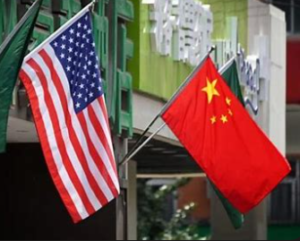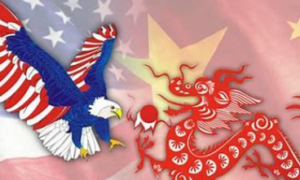China has recently imposed sanctions on 5 U.S. defense-related companies, including BAE Systems Land and Armaments, Alliant Techsystems Operations, AeroVironment, Viasat, and Data Link Solutions. This move is in retaliation to U.S. arms sales to Taiwan and U.S. sanctions on Chinese companies and individuals. The sanctions will freeze any assets these companies have in China and bar Chinese organizations and individuals from doing business with them.

The United States has a long-standing relationship with Taiwan, providing it with military equipment and support to help defend itself against potential aggression from China. This relationship has been a source of contention between the U.S. and China, with Beijing viewing such arms sales as interference in its internal affairs.
The Chinese Foreign Ministry stated that the U.S. actions have infringed upon China’s sovereignty and security interests, disrupted peace and stability across the Taiwan Strait, and violated the rights and interests of Chinese companies and individuals. The Chinese government reiterated its unwavering resolve to protect national sovereignty, security, territorial integrity, and the lawful rights and interests of Chinese companies and citizens.
Upcoming Presidential Election in Taiwan


Taiwan’s upcoming 8th direct presidential election in Taiwan is scheduled to be held on 13 January 2024 and is attracting global attention. The election outcome could redefine this complex relationship. The key issue is the government’s stance towards China, which insists on Taiwan’s eventual reunification. China’s recent sanctions on U.S. defense firms, in response to U.S. arms sales to Taiwan and sanctions on Chinese entities, add to the intricacy. This occurs amid rising tensions and fears of a potential U.S.-China military conflict over Taiwan. The election results could significantly impact Taiwan’s future, its relationship with China, and its global standing. It’s a pivotal moment for Taiwan, under the watchful eyes of the world.
U.S. Military Package for Taiwan and Its Implications

In response to a $300 million military package for Taiwan approved by the U.S. government in December, China had warned of countermeasures. This package includes equipment, training, and equipment repair to maintain Taiwan’s command, control, and military communications capabilities. The U.S. maintains that the sale will support the modernization of Taiwan’s armed forces and the maintenance of a credible defense.

Taiwan is a significant point of contention in U.S.-China relations, and there are concerns that it could potentially lead to military conflict between the two powers. China views U.S. arms sales to Taiwan as interference in its domestic affairs.
The Chinese military regularly conducts operations in and over the waters around Taiwan, partly to discourage the island’s government from declaring formal independence. While an invasion does not seem imminent, the constant military activity serves as a reminder that the threat is always there.
Implications of Sanctions-Regional Stability.

The U.S. switched diplomatic recognition from Taiwan to China in 1979, but it is obligated by its laws to ensure that Taiwan can defend itself. The U.S. and its allies regularly sail warships through the Taiwan Strait, a 160-kilometer-wide waterway that separates the island from China.
Global Reaction: The imposition of sanctions by China has raised concerns among U.S. allies and other countries with interests in the region. Many nations are closely watching the developments and are worried about the potential for further escalation in tensions between the U.S. and China.
Future Outlook: The latest move by China is likely to exacerbate existing tensions between the U.S. and China, with both countries taking a hardline stance on issues related to Taiwan. The situation could potentially lead to further confrontations and challenges for regional stability in the Asia-Pacific region.
The imposition of sanctions on U.S. defense firms by China is a clear indication of Beijing’s strong opposition to American arms sales to Taiwan. The move has further strained relations between the two global powers and has raised concerns about the potential for increased instability in the region. As both countries continue to assert their respective positions, the situation remains fluid, with significant implications for regional security and geopolitics.












Comments 1